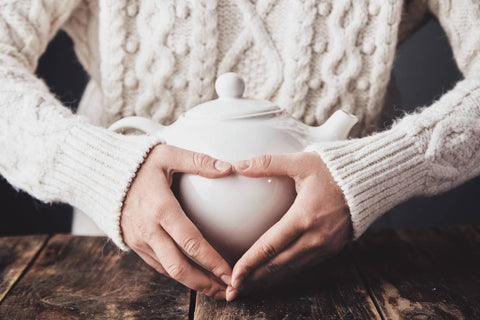Digestive problems like bloating, gas, and stomach discomfort can affect daily life. The best tea for digestion can help ease these issues by supporting gut health and improving how the body processes food. Many teas contain natural compounds that soothe the digestive system, promote beneficial gut bacteria, and reduce inflammation.
Drinking the right tea can relieve discomfort after meals, improve nutrient absorption, and keep digestion running smoothly. Herbal and traditional teas have been used for centuries to treat stomach problems, and today, they remain a simple yet powerful way to support digestive health.
Digestive Health and Tea
Tea has long been used as a remedy for digestive troubles. Many cultures have relied on herbal and fermented teas to soothe the stomach, ease bloating, and promote healthy digestion.
Certain teas work by reducing inflammation, relaxing the digestive muscles, or stimulating the production of stomach acid and bile. Drinking tea regularly can prevent stomach discomfort, improve digestion, and support a healthy gut microbiome.
Types of Teas for Digestive Health
Ginger Tea
Ginger tea is one of the most effective teas for digestion. It speeds up the emptying of the stomach, which helps prevent bloating and discomfort after meals.
The key compound in ginger, gingerol, has strong anti-inflammatory and antioxidant properties that help alleviate digestive discomfort. It helps break down food, supports nutrient absorption, and reduces nausea.
Ginger tea is especially helpful for motion sickness, morning sickness, and digestive issues caused by stress. It also promotes blood circulation, which can improve overall digestive function.
Chamomile Tea
Chamomile tea is known for its calming effects on both the nervous and digestive systems. It relaxes the muscles in the intestines, making it useful for relieving gas, cramps, and bloating.
Its anti-inflammatory properties help soothe the stomach lining and reduce irritation caused by acid reflux. People with acid reflux or mild gastritis may find chamomile tea beneficial after meals.
Since stress can worsen digestive problems, drinking chamomile tea before bed can support relaxation and better gut health. Its gentle nature makes it a great choice for sensitive stomachs.
Peppermint Tea
Peppermint tea is one of the best teas for digestion, especially for people with irritable bowel syndrome (IBS). It relaxes the muscles in the digestive tract, reducing bloating, cramping, and gas.
It also stimulates bile flow, helping the body break down fats more efficiently. This can prevent feelings of heaviness and discomfort after eating rich or greasy foods. While peppermint tea is beneficial, peppermint oil has been studied for its effectiveness in reducing IBS symptoms and relaxing gut muscles.
Peppermint has been studied for its ability to reduce IBS symptoms, including abdominal pain and irregular bowel movements. Drinking a cup after meals can help keep digestion smooth and comfortable.
Green Tea
Green tea contains antioxidants called catechins that help reduce inflammation in the gut. Chronic inflammation can lead to digestive problems, so drinking green tea regularly can promote a healthier digestive system.
It supports efficient digestion by enhancing metabolism and nutrient absorption, which can help prevent bloating and upset stomach, especially after eating starchy foods.
Green tea also helps regulate blood sugar levels by slowing down carbohydrate absorption. This can prevent spikes and crashes in energy levels after meals. Inherigin’s Aromatic Brew Green Tea offers a fresh, gentle seaweed aroma and a delicate bitterness that transforms into sweetness, making it a refreshing and gut-friendly option.
Black Tea
Black tea contains theaflavins, which promote the growth of beneficial gut bacteria. A balanced gut microbiome is crucial for digestion, immune health, and overall well-being.
Drinking black tea may also help regulate bowel movements. It provides mild stimulation to the intestines, which can prevent constipation and sluggish digestion. Black tea and other digestive teas are commonly available in health food stores, which offer a variety of options for those seeking natural remedies.
Some research suggests that black tea can aid in weight management by improving digestion and metabolism. It may reduce fat absorption and help maintain balanced blood sugar levels. Inherigin’s Ruby Ceylon Black Tea features floral notes with an earthy finish, making it a refined choice for gut support.
Dandelion Root Tea
Dandelion root tea is rich in inulin, a prebiotic fiber that feeds beneficial gut bacteria. A healthy gut microbiome improves digestion, boosts immunity, and reduces bloating.
This tea also supports liver function, which plays a key role in digestion by producing bile. Bile helps break down fats and remove toxins from the body.
Dandelion tea can also help reduce water retention. This makes it a great option for people who feel bloated or sluggish.
Gentian Root Tea
Gentian root tea is known for its bitter taste, which stimulates the release of digestive enzymes and bile. This makes it especially useful for people with slow digestion or a heavy feeling after meals.
The bitter compounds in gentian root activate taste receptors that signal the stomach to produce more acid. This helps break down food more efficiently and prevents bloating.
It has been traditionally used to treat nausea, loss of appetite, and digestive weakness. Though it has a strong flavor, its digestive benefits make it a powerful choice.
Fennel Tea
Fennel tea helps reduce bloating and gas by relaxing the muscles in the intestines. This allows trapped gas to pass more easily, preventing discomfort.
It also supports regular bowel movements by promoting digestion and reducing inflammation in the gut. People who experience occasional constipation may find fennel tea helpful.
Fennel contains protective compounds that can help prevent stomach ulcers and reduce irritation from acid reflux. Drinking it after meals can promote smooth digestion.
Raspberry Leaf Tea
Raspberry leaf tea has a mild diuretic effect, which helps reduce bloating and excess water retention. This makes it beneficial for people who feel puffy or sluggish after eating.
It contains antioxidants and tannins that support gut health and strengthen the digestive system. Some people use it to relieve mild stomach pain and promote gut balance.
Though commonly associated with women’s health, raspberry leaf tea benefits digestion for both men and women.
Oolong Tea
Oolong tea combines the benefits of both green and black tea. It helps break down fats, preventing bloating and discomfort after fatty meals.
It also promotes the growth of healthy gut bacteria, which improves digestion and supports immune function. A well-balanced gut microbiome is crucial for long-term digestive health.
Oolong tea naturally boosts metabolism, helping the body process food more efficiently. Inherigin’s See You Tomorrow Oolong Tea, with its peachy sweetness and smooth finish, provides digestive support while offering a refreshing taste. The Shape Me blend, infused with apple and roselle, also energizes and aids digestion.
For those who enjoy a creamier option, Milk Waterfall combines oolong tea with a caramel, buttery taste. This gentle tea is smooth on the stomach and provides a satisfying sip throughout the day.
How to Incorporate Digestive Teas into Your Routine
Drinking digestive tea at the right time can improve how the body processes food and prevent discomfort. Some teas work best before meals to prepare the stomach, while others are more effective after eating to soothe digestion. Choosing the right tea for different situations can maximize its benefits.
Teas that stimulate digestion, such as ginger and peppermint, are best consumed before meals. Ginger warms the stomach and encourages the production of digestive enzymes, helping the body break down food more efficiently. Peppermint relaxes the digestive muscles, reducing the chance of bloating and cramps. Drinking these teas 20–30 minutes before eating can help prevent heaviness and discomfort after a meal.
Teas that calm digestion, such as chamomile and fennel, work well after meals. Chamomile relaxes the digestive tract and reduces inflammation, making it a good choice for acid reflux or indigestion. Fennel helps release trapped gas and eases bloating. Drinking these teas after eating can promote a smoother digestive process.
Teas that calm digestion, such as chamomile and fennel, work well after meals. Chamomile relaxes the digestive tract and reduces inflammation, making it a good choice for acid reflux or indigestion. Fennel helps release trapped gas and eases bloating. Drinking these herbal tea options after eating can promote a smoother digestive process.
Tea blends can offer multiple benefits by combining ingredients with complementary effects. Ginger and peppermint together can ease nausea and support digestion, while chamomile and green tea can promote relaxation and gut balance. Mixing different teas throughout the day can help address various digestive concerns.
Temperature can also impact digestion. Warm tea relaxes the stomach and encourages digestion, making it ideal for soothing discomfort or aiding sluggish digestion. Cold tea can be refreshing and hydrating, which is beneficial in hot weather or after heavy meals. Inherigin’s Energize Me tea, infused with tropical fruits and vitamin C, is a great iced option that supports digestion while refreshing the body.
Consistency is key for long-term digestive health. Drinking tea daily, whether in the morning, after meals, or before bed, can help maintain a balanced digestive system. Finding a routine that works best for individual needs can make a noticeable difference in gut health.
Benefits of Drinking Digestive Teas
Digestive teas offer a natural way to support gut health by reducing inflammation, promoting beneficial bacteria, and improving digestion. These teas work with the body’s natural processes to prevent discomfort and improve overall well-being.
Many digestive issues stem from inflammation in the gut. Chronic inflammation can cause bloating, discomfort, and irregular bowel movements. Teas like chamomile, ginger, and green tea contain compounds that soothe the gut lining, reducing irritation and supporting healthy digestion.
Some teas also contain prebiotics—compounds that feed good gut bacteria. A balanced gut microbiome is essential for digestion, immune function, and nutrient absorption. Black tea and oolong tea encourage the growth of beneficial bacteria, helping maintain gut balance over time. Inherigin’s Dazzling Me tea, made with marigolds and roses, gently supports metabolism while nourishing the body.
Regular tea consumption can help prevent and relieve common digestive problems like constipation, bloating, and acid reflux. Peppermint and fennel tea relax the intestines, allowing gas to pass easily and reducing bloating. Dandelion tea stimulates bile production, which helps break down fats and prevents sluggish digestion.
Beyond digestion, tea can also improve overall well-being. Stress and poor sleep can negatively affect digestion, leading to discomfort and irregular bowel movements. Calming teas like chamomile and rose oolong, such as Inherigin’s Alluring Me, help reduce stress and promote relaxation, which indirectly supports gut health.
Making digestive tea a regular habit can lead to long-term improvements in gut function. Whether used to relieve occasional digestive discomfort or as part of a daily wellness routine, digestive teas offer a simple, natural way to support overall health.
The Best Tea for Digestion: Choosing the Right One for Gut Health
Drinking tea can help with bloating, gas, and stomach discomfort. Some teas, like ginger and peppermint, improve digestion before meals, while others, like chamomile and fennel, work after eating to ease discomfort. Green, black, and oolong teas provide antioxidants and support gut bacteria, making them great for long-term digestive health.
Teas with prebiotics and anti-inflammatory properties, including various herbal teas, help balance the gut microbiome and reduce irritation. Drinking the right tea at the right time can improve digestion, reduce stomach issues, and support overall well-being. Making tea a daily habit is an easy and natural way to keep digestion on track.
At Inherigin, we believe good digestion starts with high-quality, sustainably grown tea. Our teas, like Shape Me oolong tea with apple and roselle, support digestion while offering a refreshing taste. By combining traditional craftsmanship with eco-friendly farming, we create teas that not only taste great but also benefit gut health.
If you’re looking for a natural way to improve digestion, explore our collection. With a variety of teas to suit different digestive needs, we offer a delicious and healthy way to keep your stomach happy.


